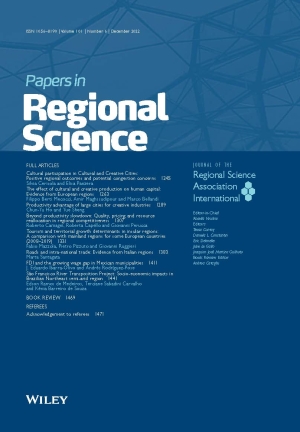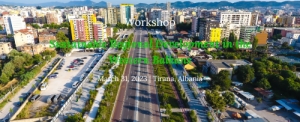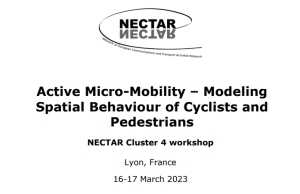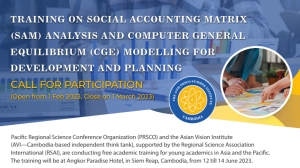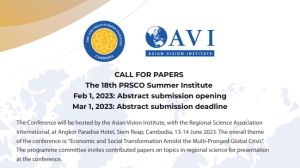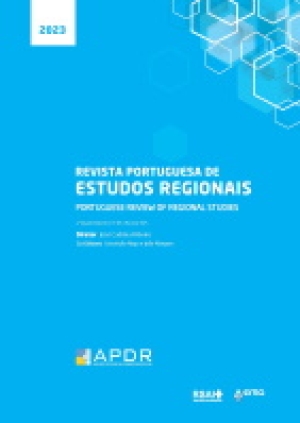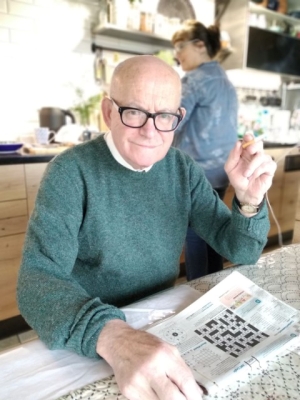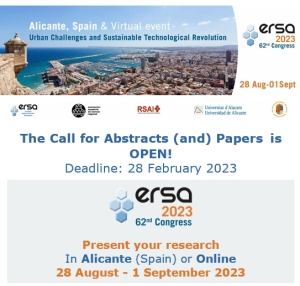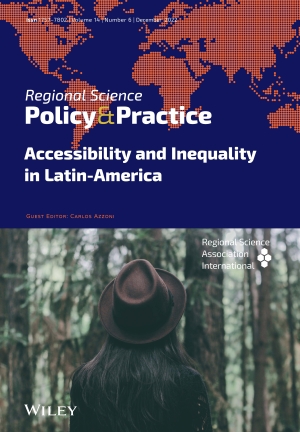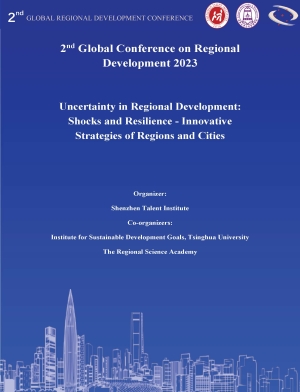Archives
Elisabete Martins
The latest issue of Papers in Regional Science are available! Volume 101, Issue 6, December 2022
|
Papers in Regional Science Pages: 1243-1472 December 2022 |
ISSUE INFORMATION
![]() Free Access
Free Access
Pages: 1243-1244 | First Published: 17 January 2023
FULL ARTICLES
Silvia Cerisola, Elisa Panzera
Pages: 1245-1261 | First Published: 16 December 2022
The effect of cultural and creative production on human capital: Evidence from European regions
Filippo Berti Mecocci, Amir Maghssudipour, Marco Bellandi
Pages: 1263-1287 | First Published: 02 November 2022
Productivity advantage of large cities for creative industries
Chun-Yu Ho, Yue Sheng
Pages: 1289-1306 | First Published: 04 December 2022
![]() Open Access
Open Access
Beyond productivity slowdown: Quality, pricing and resource reallocation in regional competitiveness
Roberto Camagni, Roberta Capello, Giovanni Perucca
Pages: 1307-1330 | First Published: 31 August 2022
![]() Open Access
Open Access
Fabio Mazzola, Pietro Pizzuto, Giovanni Ruggieri
Pages: 1331-1382 | First Published: 05 September 2022
Roads and intra‐national trade: Evidence from Italian regions
Marta Santagata
Pages: 1383-1409 | First Published: 11 January 2023
![]() Open Access
Open Access
FDI and the growing wage gap in Mexican municipalities
Eduardo Ibarra-Olivo, Andrés Rodríguez-Pose
Pages: 1411-1439 | First Published: 29 November 2022
Edson Ramos de Medeiros, Terciane Sabadini Carvalho, Kênia Barreiro de Souza
Pages: 1441-1468 | First Published: 23 November 2022
BOOK REVIEW
New frontiers of policy evaluation in regional science. Edited by Yoshiro Higano N |Lily Kiminami | Kenichi Ishibashi. Volume 52. Series: New Frontiers in Regional Science: Asian Perspectives. Springer Nature Singapore Pte Ltd. 2022. 412 pp. ISBN 978–981–16–4500–6; ISBN 978–981–16–4501–3 (eBook). https://doi.org/10.1007/978-981-16-4501-3
Cristina Bernini
Pages: 1469-1470 | First Published: 04 November 2022
REFEREES
Pages: 1471-1472 | First Published: 17 January 2023
Workshop on Sustainable Regional Development in the Western Balkans | March 31, 2023 | Tirana, Albania
The scientific journal Regional Science Policy and Practice belongs to Regional Science Association International and it is committed to promote the development of Regional Science across the globe specifically through the promotion of special issues on nurtured by workshops.
The main purpose of this first workshop is to mobilize and nurture talents across the Western Balkans, publish a special issue of the journal on Sustainable Regional Development and European Integration in Western Balkans and support RSAI in the creation of regional science sections in Western Balkans.
The workshop seeks to enhance participants understanding of recent developments and methodologies that could be useful for spatial and regional analysis facilitating the European integration and implementation of sustainable development goals in the Western Balkan region. Spatial assessment is more important to our understanding of economic and geographical problems, the workshop will develop the skillsets and knowledge of regional scientist to be able to analyse and understand complex spatial problems and to apply these tools in developing innovative research, in policy making and further expanding research capacities in the Western Balkan region.
Through this workshop, participants will be able to learn and apply spatial econometric models, geographic data, agglomeration and movement of labour and capital to make informed policy decisions that can facilitate the European integration process. Participants will have the opportunity to present their research and receive constructive feedback from peers and senior scholars.
NECTAR Cluster 4 workshop on Active Micro-Mobility – Modeling Spatial Behaviour of Cyclists and Pedestrians
Dear NECTAR colleagues,
Cluster 4 is organising a workshop on Active Micro-Mobility – Modeling Spatial Behaviour of Cyclists and Pedestrians, 16-17 March 2023. The workshop is organized by LAET-ENTPE (University of Lyon), Lyon, France.
If you are interested to participate in this workshop, please submit an abstract (about 500 words) before 13 February 2023. See the call for papers for details attached.
Best regards
Ana Condeço-Melhorado
NECTAR Secretary

CALL FOR PARTICIPATION | Training on Social Accounting Matrix (SAM) Analysis and Computer General Equilibrium (CGE) Modelling For Development and Planning, Angkor Paradise Hotel, in Siem Reap, Cambodia, 12-14 June 2023
Training on Social Accounting Matrix (SAM) Analysis and Computer General Equilibrium (CGE) Modelling For Development and Planning
CALL FOR PARTICIPATION
(Open from 1 Feb 2023, Close on 1 March 2023)
Pacific Regional Science Conference Organization (PRSCO) and the Asian Vision Institute (AVI—Cambodia-based independent think tank), supported by the Regional Science Association International (RSAI), are conducting free academic training for young academics in Asia and the Pacific. The training will be at Angkor Paradise Hotel, in Siem Reap, Cambodia, from 12 till 14 June 2023.
Aims:
The purpose of this training is to provide adequate knowledge on Social Accounting Matrix (SAM) analysis and Computable General Equilibrium Modelling for development planning, focusing on achieving the sustainable development goals (SGDs). This training is also to stimulate interactions and network development among participants as well as with senior academics in the region. Not only that will they be equipped with well-defined analytical methods on development planning, after graduating from this training, participants would also be provided with more knowledge about methods within regional science.
Activities:
Participants are expected to attend a set of 3-day activities as follows.
1. The one-and-a-half-day pre-conference training:
a. 12 June 2023, 08:00am – 5:00 pm
b. 13 June 2023, 08:00am – 12:00pm
2. The one-and-a-half-day conference: The 18th PRSCO Summer Institute
a. 13 June 2023, 02:00pm – 06:00pm
b. 14 June 2023, 08:00pm – 05:00pm
NB: Attending only some of the above activities is not permitted.
Subjects Covered in the Training:
- Poverty and inequality: Concepts and measurements
- Sustainable development
- Social Accounting Matrix (SAM) for development planning
- Introduction to the concept of computable general equilibrium (CGE)
- Implementing a CGE using GAMS software
- CGE for Development Planning
Trainers
- Professor Budy P. Resosudarmo of the Australian National University (https://crawford.anu.edu.au/people/academic/budy-p-resosudarmo)
- Associate Professor Yuri Mansury of the Illinois Institute of Technology (https://www.iit.edu/directory/people/yuri-mansury) .
Supports for the Training:
All accepted participants will receive the training and its material for free. Four-night accommodation and lunch during the pre-conference training and conference will be provided. Registration fee to attend the conference will also be waived.
All accepted participants, however, should cover all other costs to participate in this training and conference, such as costs of transportation to and from Siem Reap, dinner and personal spending during the training and conference.
All accepted participants should bring their own laptop to the training. No computer facilities will be provided.
Who can apply?
All early- and mid-career academics receiving their Master’s or PhD degree after 2015 are invited to apply. Female academics and those located in the lower Mekong countries are encouraged to apply. A total of 20 successful applicants will be selected to join the training program.
How to Apply:
Application form can be downloaded over here (https://prscocambodia.org). Deadline for application submission is on 1 March 2023.
At the end of the program, a training certificate will be given by the Asian Vision Institute.
In Partnership with
Pacific Regional Science Conference Organization (PRSCO) Summer Institute
Supported by
Regional Science Association International (RSAI)
Asian Vision Institute (AVI)
Call for Papers: PRSCO 2023, Siem Reap, Cambodia, 13-14 June 2023.
CALL FOR PAPERS
The 18th PRSCO Summer Institute Feb 1, 2023: Abstract submission opening
Mar 1, 2023: Abstract submission deadline
The Conference will be hosted by the Asian Vision Institute, with the Regional Science Association International, at Angkor Paradise Hotel, Siem Reap, Cambodia, 13-14 June 2023. The overall theme of the conference is: “Economic and Social Transformation Amidst the Multi-Pronged Global Crisis”. The programme committee invites contributed papers on topics in regional science for presentation at the conference.
The committee will welcome papers on any aspect of regional science, and would particularly welcome papers reporting research or case studies on the following themes:
- Regional economics and development
- Income inequality and regional disparities
- Infrastructure, basic utilities and regional management
- Public services and human development
- Trade, investment and economic growth
- Decentralization and regional fiscal policies
- Regional macro and financial policies
- Local government innovation and governance
- Economic shocks and social safety nets
- nflation and exchange rate policies
- Culture, land and village development
Extended paper abstract of about 500 words should be submitted online via https://prscocambodia.org by 1 March 2023.
Abstract should consist of background, data and methodology, potential contributions, and keywords. Abstracts must be submitted in English.
Paper sessions are seminar-style for each paper and ample time for discussion and for participants to provide constructive feedback to authors. Paper presentations will be in English.
Important dates:
Feb 1, 2023: Abstract submission opening
Mar 1, 2023: Abstract submission deadline
Apr 1, 2023: Early bird registration open
Apr 1, 2023: Notification of abstract acceptance
May 1, 2023: Early bird registration end
May 22, 2023: Paper presenter registration deadline
Jun 5, 2023: Non-presenter registration deadline
Jun 12 – 13, 2023: Pre-conference training
Jun 13 – 14, 2023: Conference date
In Partnership with
Pacific Regional Science Conference Organization (PRSCO) Summer Institute
Supported by
Regional Science Association International (RSAI)
Asian Vision Institute (AVI)
Portuguese Review of Regional Studies (RPER): Nº 63 (2023) is already available!
In Memoriam: John Brian Parr (1941-2023)
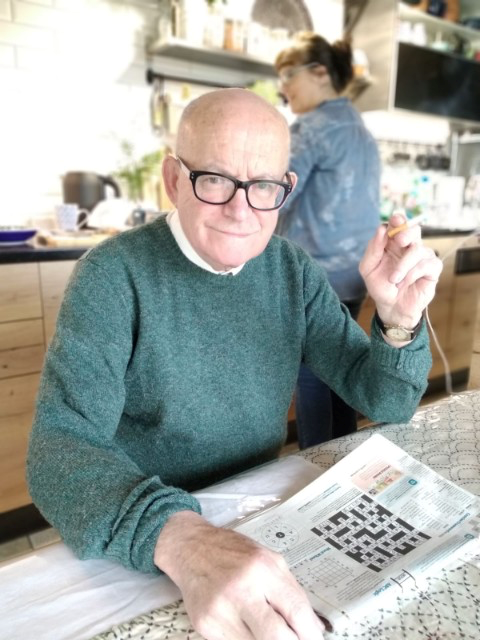 John Parr, a member of the Regional Science Association International (RSAI) since the mid 1960s passed away at his home in London in early January 2023. John was born in the U.K. and graduated from University College, London with a degree in economics in 1962. In 1967, he completed his Ph.D. in economic geography at the University of Washington working with Morgan Thomas and Charles Tiebout. From 1967 until 1975, he was successively Assistant and then Associate Professor in the Department of Regional Science at the University of Pennsylvania. He then returned to the UK and from 1975 until 2015 he was a member of the faculty in what ended up as the Department of Urban Studies, in the University of Glasgow in Scotland; he was promoted to Professor in 1989. After retiring from Glasgow, he returned to London in 2016 when he was appointed an Honorary Professor in the Bartlett School of Planning at his alma mater, University College London. He was a frequent visiting scholar at institutions in the US (especially Illinois and West Virginia), Australia, New Zealand and Israel. After his return to the UK in 1975, he became very active in the British Section (now British & Irish Section) of RSAI, serving as Chairman of the section from 1981-1985; however, he retained an affinity for the North American Regional Science (NARSC) conferences and for the World Congresses of RSAI. He was elected as an Academician (Fellow) of the UK Academy of Social Sciences in 2000. From the RSAI: British and Irish Section, he received the Moss Madden Memorial Medal in 2003 and a Lifetime Achievement Award in 2015. Parr was elected as a Fellow of the RSAI in 2006.
John Parr, a member of the Regional Science Association International (RSAI) since the mid 1960s passed away at his home in London in early January 2023. John was born in the U.K. and graduated from University College, London with a degree in economics in 1962. In 1967, he completed his Ph.D. in economic geography at the University of Washington working with Morgan Thomas and Charles Tiebout. From 1967 until 1975, he was successively Assistant and then Associate Professor in the Department of Regional Science at the University of Pennsylvania. He then returned to the UK and from 1975 until 2015 he was a member of the faculty in what ended up as the Department of Urban Studies, in the University of Glasgow in Scotland; he was promoted to Professor in 1989. After retiring from Glasgow, he returned to London in 2016 when he was appointed an Honorary Professor in the Bartlett School of Planning at his alma mater, University College London. He was a frequent visiting scholar at institutions in the US (especially Illinois and West Virginia), Australia, New Zealand and Israel. After his return to the UK in 1975, he became very active in the British Section (now British & Irish Section) of RSAI, serving as Chairman of the section from 1981-1985; however, he retained an affinity for the North American Regional Science (NARSC) conferences and for the World Congresses of RSAI. He was elected as an Academician (Fellow) of the UK Academy of Social Sciences in 2000. From the RSAI: British and Irish Section, he received the Moss Madden Memorial Medal in 2003 and a Lifetime Achievement Award in 2015. Parr was elected as a Fellow of the RSAI in 2006.
His main interests centered in regional/spatial policy and the spatial structure of regions with a strong commitment to exploring and re-interpreting the works of von Thünen, Christaller and Lösch. In his more recent work, the role of spatial structure infused several papers that explored new interpretations of regional policy, its challenges and, in many cases, its failures viewed through the lens of spatial organization broadly conceived. His publication list is extensive and includes many contributions in the Papers in Regional Science (and its earlier form), Journal of Regional Science, Annals of Regional Science, Urban Studies, Regional Studies, Economic Geography, Environment and Planning and Spatial Economic Analysis. These works, with different foci and methodology, have in common an excellent writing style; Parr had little patience for obfuscation and felt it important that articles should be easy to read. Editors who attempted to change this style usually received a certain amount of opprobrium with one editor commenting that Parr was the most difficult author with whom he had to deal! After several articles on regional policy (the focus of his doctoral dissertation), the bulk of his attention was directed to the spatial structure of city systems, initially drawing inspiration from central place theory. He had enormous admiration for Lösch and would return to his contributions frequently throughout his career. For the last decade, he refocused once more on regional policy but now infused with new interpretations based on the structure of regional economies and their embedded urban systems. The ideas ranged from alternative views and definitions of agglomeration economies, the structure of interdependence within urban systems and even returning to consideration of the role of spatial administration.
In many ways, his academic contributions were equaled by his commitment to enhancing the field of regional science, broadly defined. His presence in many conferences each year was a very visible manifestation of this sense of the role of more senior scholars; many colleagues have commented on the myriad ways he assisted them during their careers, one remarking that Parr had become a valued mentor, by being the academic and person he was rather than explicitly giving advice. He had a great sense of humor that was infectious; he took his work seriously but rarely himself and graciously tolerated the gentle ribbing that inevitably occurred.
Parr’s wife of 49 years, Pamela, died in 2014; he is survived by his two daughters Sheila and Anne.
ERSA2023 Call for Abstracts (and) Papers in now OPEN!
|
|
|
|
|
|
|
|
|
|
The latest issue of Regional Science Policy & Practice are available! Vol. 14, No. 6, December 2022, Special Issue: Accessibility and Inequality in Latin-America
|
Pages: 181-370 December 2022 Issue Edited by: Carlos Azzoni |
ISSUE INFORMATION
![]() Free Access
Free Access
Pages: 181-182 | First Published: 11 January 2023
INTRODUCTION
Accessibility and inequality in Latin America
Carlos Azzoni
Pages: 183-184 | First Published: 11 January 2023
ORIGINAL ARTICLES
Impact of airport policies on regional development. Evidence from the Colombian case
Oscar Díaz Olariaga, Carlos Alonso-Malaver
Pages: 185-210 | First Published: 01 October 2021
Criteria prioritization for investment policies in General Aviation aerodromes
Mauro Caetano, Evandro José Silva, Diogo José Vieira, Cláudio Jorge Pinto Alves, Carlos Müller
Pages: 211-233 | First Published: 19 April 2022
Transport and density of population groups in the urban area of the city of Salvador
Daniel S. A. Carvalho, Gervásio F. Santos
Pages: 234-253 | First Published: 08 November 2021
Public transport and gentrification. Evidence from São Paulo metro new stations
Vitor Pestana Ostrensky, Alexandre Alves Porsse, Leonardo Matsuno da Frota
Pages: 254-269 | First Published: 19 April 2022
Inter‐provincial trade in Argentina: Financial flows and centralism
Pedro Elosegui, Marcos Herrera-Gomez, Jorge Colina
Pages: 270-291 | First Published: 26 December 2021
The potential impact of products seized on the western border of Paraná on the Brazilian economy
Carlos Alberto Goncalves Jr, Ricardo Luis Lopes, Cristiano Stamm
Pages: 292-307 | First Published: 17 July 2021
Public sector efficiency in Brazil
Francisco Germano Carvalho Lucio, Jhorland Ayala-García
Pages: 308-321 | First Published: 16 August 2021
Felipe Livert, Cecilia Osorio, Jose Acuña
Pages: 322-343 | First Published: 16 November 2022
Income inequality and economic complexity: Evidence from Mexican states
Manuel Gómez-Zaldívar, María Isabel Osorio-Caballero, Edgar Juan Saucedo-Acosta
Pages: 344-363 | First Published: 27 September 2022
BOOK REVIEWS
Family Business Case Studies across the World: Succession and Governance in a Disruptive Era, edited by Jeremy Cheng, Luis Diaz‐Matajira, Nupur Pavan Bang, Rodrigo Basco, Andrea Calabro, Albert E. James, Georges Samara Cheltenham, Edward Elgar publishing, 2022, DOI: https://doi.org/10.4337/9781800884250
Piotr Pachura
Pages: 364-365 | First Published: 21 August 2022
Amitrajeet A. Batabyal
Pages: 366-367 | First Published: 29 November 2022
REFEREES
Pages: 368-370 | First Published: 11 January 2023
FINAL PROGRAMME : The Second Global Conference on Regional Development January 13-14, 2023
Announcement
Dear TRSA members & friends:
This week will be the start of the Second Global Conference on Regional Development on the theme: “Uncertainty in Regional Development: Shocks and Resilience - Innovative Strategies of Regions and Cities”, to be held in the Shenzhen Greater Bay Area, China, from January 13-14, 2023. This is unfortunately an online venue due to the alarming corona explosion in China.
You are cordially invited to participate online in this prestigious and international event, which is co-organized by The Regional Science Academy, the Shenzhen Talent Institution and Tsinghua University, School of Public Policy & Management, Beijing.
We are pleased to inform you that Professor Paul Krugman, Nobel laureate in economics, will give a keynote lecture on ‘Is the 'New Economic Geography' still Relevant in 2023?’. He will also join the interesting Round Table discussion on Friday, January 13, 2022 at 20:45-22:00 (Beijing local time), while also Saskia Sassen, Michael Porter, Edward Glaeser, Michael Storper, and many other renowned speakers will join.

On Saturday, January 14, 2023 at 20:45-22:00 (Beijing time), Edward Glaeser (Harvard University) will present the TRSA lecture on GREAT MINDS IN REGIONAL SCIENCE on: The Scientific Significance of Paul Krugman, which will be followed by a concise Round Table discussion also joined by Paul Krugman, Edward Glaeser and other interesting panel members.

We have great pleasure in sending you herewith the final programme (see also: https://we.tl/t-y5dv3e0o5H). To get a full and free access to the conference please inform Ying Xue (This email address is being protected from spambots. You need JavaScript enabled to view it. and This email address is being protected from spambots. You need JavaScript enabled to view it.. It promises to become an exciting event with a great audience and more than 1000 (online) participants! Despite the corona limitations, the conference promises to become a scientific highlight which will set the tone for innovative thinking on new regional and urban development concepts and practices. We look forward to meeting you this week and to continue our cooperation in the coming years.
We will be pleased and honoured to have you with us in this Second Global Conference.
Cordially yours,
Karima Kourtit, also on behalf of Peter Nijkamp and Chinese hosts.

About Us
The Regional Science Association International (RSAI), founded in 1954, is an international community of scholars interested in the regional impacts of national or global processes of economic and social change.

